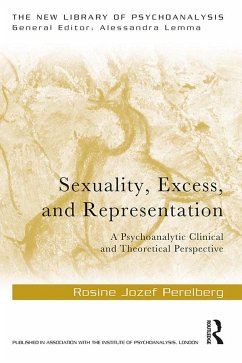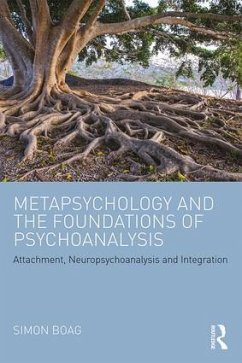
Metapsychology for Contemporary Psychoanalysis
Mind, World, and Self
Versandkostenfrei!
Versandfertig in 1-2 Wochen
64,99 €
inkl. MwSt.
Weitere Ausgaben:

PAYBACK Punkte
32 °P sammeln!
Metapsychology for Contemporary Psychoanalysis is a complete revision of the theoretical underpinnings of psychoanalysis and psychodynamic psychotherapy. It seeks to replace the traditional drive-defence model of Freudian tradition with an information processing model of the mind. This book argues that the central human need is for self-knowledge, and that drives are best understood as means towards this end. Richard Sembera begins with a close reading of Freud's own metapsychological writings, isolating the many unresolved difficulties and inconsistencies which continue to burden psychoanalyt...
Metapsychology for Contemporary Psychoanalysis is a complete revision of the theoretical underpinnings of psychoanalysis and psychodynamic psychotherapy. It seeks to replace the traditional drive-defence model of Freudian tradition with an information processing model of the mind. This book argues that the central human need is for self-knowledge, and that drives are best understood as means towards this end. Richard Sembera begins with a close reading of Freud's own metapsychological writings, isolating the many unresolved difficulties and inconsistencies which continue to burden psychoanalytical theory today. By returning to the actual observable clinical phenomena in the analytic situation, it is shown that an alternative interpretation is possible that eliminates the theoretical difficulties in question. In the analytic situation, Sembera argues that clinicians do not in fact see individuals struggling against the expression of biological drives, rather they observe individuals struggling to clarify their experience of themselves in the presence of the analyst and put this experience into words. When this process is formalized and expressed in theoretical terms, it is found to consist of three distinct aspects:¿objectification, imagination, and symbolization. This process as a whole-ascent towards the other, relationship with the other, disclosure of self in the light of the other-is termed the dialectical structure of the self. It is conceptualized as the main accomplishment of the core mental process, the process of contextualization. This work is distinguished from other attempts at theoretical revision by its fundamental commitment to coherence and clarity as well as its determination to challenge accepted psychoanalytic dogma. It argues for the complete irrelevance of biology and neuroscience to the psychoanalytic enterprise and rejects the theory of drives in its entirety. Instead it affirms the centrality of the traumatic response to mental functioning, emphasises the social matrix in which drives are embedded, re-examines the concepts of free will, accountability, and responsibility, and concludes with an attempt to understand waking life as a creative product analogous to the lucid dream.¿ Drawing on major psychoanalytic thinkers including Bollas and Benjamin, and current philosophy of mind, this book provides readers with a clear, updated model of metapsychology. Metapsychology for Contemporary Psychoanalysis will appeal to psychoanalysts and psychotherapists, as well as philosophy scholars and anyone with an interest in the philosophy of psychoanalysis.














